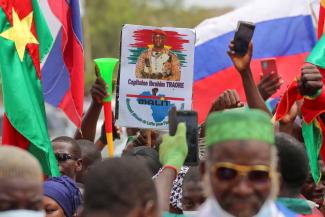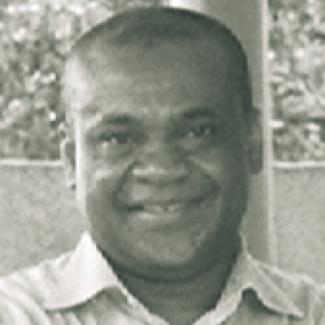Military coup
What pro-Russian protests mean in West Africa

At the end of September, Ibrahim Traoré, an army captain, grabbed power from Paul Henri Sandaogo Damiba, a lieutenant-colonel, who was serving as Burkina Faso’s head of state. Damiba had toppled the civilian President Roch Marc Christian Kaboré in late January.
As Damiba did then, Traoré now promises to rid the country of terrorism. Indeed, Islamist insurgents are wreaking havoc in Burkina’s north. In October, they controlled about 40 % of the country and perhaps more. Under Damiba, the situation had kept worsening. The sense of public frustration grew, and Traoré and his allies in the military took notice. Their coup fits a current pattern according to which army officers stage a coup because of a worsening security situation (see Vladimir Antwi-Danso on www.dandc.eu).
Burkina Faso is a poor country with a population of about 19 million. Many people live from hand to mouth, and the environmental crisis is making it increasingly hard to eke out a living. People therefore appreciated Traoré’s decision to airlift food supplies to Djibo, a northern town held by jihadists. The humanitarian situation there is desperate.
Tensions within the army
Traoré faces huge challenges. One problem is that the military itself is deeply divided. High-ranking officers enjoy perks, but low-ranking troops are poorly equipped and sometimes even lack food and ammunition on the front lines.
There is a long history of infighting in the armed forces, moreover. In 1987, Blaise Compaoré ousted Thomas Sankara, a charismatic, leftist military dictator. Compaoré was Sankara’s ally until he turned against him, had him killed and became military leader himself. Compaoré relied on a “presidential guard” composed mostly of men from his own tribe. Some say that he also cooperated with the jihadists, paying them to spare his country for many years.
Compaoré lost power in a popular uprising in 2014. However, attempts to establish a well-functioning democracy failed. Traditional chiefs, who wield much influence though they do not have a constitutional role, tend to support military rule in desperate situations. Many of them felt neglected in recent years, moreover.
Celebrating the coup
Rallies of young people celebrated Traoré’s coup in October, with some waving Russian flags. They may hope that support from the Wagner Group, a Russian military-service provider, and other Moscow-endorsed entities may help Traoré stem the jihadis. However, the pro-Russian stance is best understood as an expression of anti-French feelings.
Those feelings are strong throughout West Africa. People are aware of the country’s oppressive colonial history, and they resent the close ties French presidents maintained to obviously corrupt African counterparts, including Compaoré in Burkina Faso, decade after decade. It also matters that current Sahelian strife began to escalate, particularly in Mali, when massive weapon supplies became available after the fall of Libya’s dictator Muammar al-Gaddafi in 2011. At the time, Nicolas Sarkozy and David Cameron, then the top policymakers of France and Britain respectively, were the main proponents of the UN-endorsed intervention which facilitated Gaddafi’s end, without, however, taking control of the resulting security problems in Libya and the Sahel region.
Today, many see France as a weakening, mid-size power. Its intervention to stop jihadism in Mali failed, and a military government is now in charge there too. As violence kept spreading in the Sahel region in recent years, the attitude of French troops was considered to be condescending towards Africans (see Lori-Anne Theroux-Bénoni on www.dandc.eu).
The Economic Community of West African States (ECOWAS) does not have a coherent approach to dealing with military regimes. Some national leaders, like Macky Sall of Senegal and Faure Gnassingbé of Togo, are tolerant of their harsh stance. By contrast, President Alassane Ouattara of Côte d’Ivoire says he does not like the military in power. He is in favour of a regional force to help put an end to military takeovers.
Quite obviously, Burkina Faso needs effective support. The security situation is desperate – and so are masses of people.
Karim Okanla is a media scholar.
karimokanla@yahoo.com








